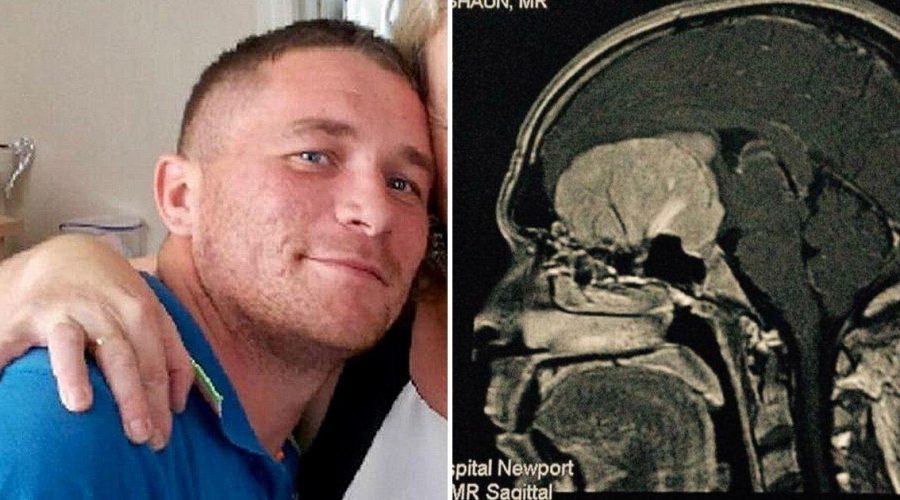'I went from being easygoing to horny and aggressive because of a brain tumour'

A man has shared how increased levels of fatigue, aggression, and horniness were actually signs that he had a tumour the size of an orange on his brain.
Shaun Turner, 38, was diagnosed in 2014 after he lost both his sense of smell and eyesight.
He also went from being ‘chilled and easygoing’ to ‘really tired all the time, really horny and aggressive.’
Dad-of-two Shaun, a Bosun at Red Funnel, from East Cowes, Isle of Wight, said: ‘I had personality changes. I’m normally very chilled and easygoing with loads of energy.
‘The effects of the tumour made me really tired all the time, really horny and aggressive.’
At the same time as his mood and libido changes, Shaun started to slowly lose his vision.
So his wife booked him in for an eye test, which is what first revealed there was something amiss.
This led to a scan that finally showed the culprit – an orange-sized mass on Shaun’s brain.


He underwent a procedure to remove the tumour, and now needs regular check-ups to monitor his health.
‘In all honesty when I found out it didn’t feel real,’ said Shaun. ‘My entire family and friends were all so worried about it that I didn’t feel able to show any weakness or that it fazed me.
‘I had a positive attitude and genuinely believed I would be alright, but I was terrified inside.
‘I believe there are very small traces left which is what I had radiotherapy for in December 2020.’
On top of Shaun’s terrifying ordeal and against all odds, the family were dealt another dreadful brain tumour blow when his mother Jill died of glioblastoma (GBM) in 2018.
Even though Jill – who was first misdiagnosed with a mental breakdown – endured intense radiotherapy, the cancer was still too aggressive, and she died just four months later.
Shaun’s brother, Daniel, 36, an electrician, said: ‘For the disease to have struck our family twice was shocking, and we have asked doctors the likelihood of passing it onto our children, but they have said it is purely bad luck.
‘My brother has had genetic testing and there is nothing to prove it is in your family gene – it’s just awful luck.
‘The treatment my mum had in such a short space of time caused side effects including extreme fatigue and you could see how it was impacting her physically.
‘Looking back knowing what we know now, we may have chosen a different treatment pathway.’



This week, in a bid to raise money for the charity Brain Tumour Research, Daniel joined a team of nine cyclists to take on the 68-mile Isle of Wight Randonnée bike riding event.
Dozens of cyclists were successful in not just finishing the route around the island, but raising more than £10,000 too.
‘Supporting a charity that focuses on the research into brain tumours is vitally important so we can help find better treatment options and eventually find a cure for the disease,’ said Daniel.
‘It’s too late for my mum, but for people like Shaun who are living with the disease, we must progress the research of brain tumours and bring it in line with advances in the treatment of other cancers.’



In the UK, 16,000 people are diagnosed with a brain tumour each year – but still, what’s happened to Daniel and Shaun’s family is exceptionally rare.
Dr Karen Noble, director of research, policy, and innovation at Brain Tumour Research, said: ‘We are sorry to hear this has happened in Daniel’s family, but are grateful for all his fundraising efforts.
‘Brain tumours are indiscriminate; they can affect anyone at any age.
‘To have these two diagnoses in the same family is an extremely rare occurrence, less than a one in a million chance.
‘If we are to change the stark facts around survival of this disease, then we simply must invest more into discovery science – the route to a cure.’
Do you have a story to share?
Get in touch by emailing [email protected].
Source: Read Full Article
